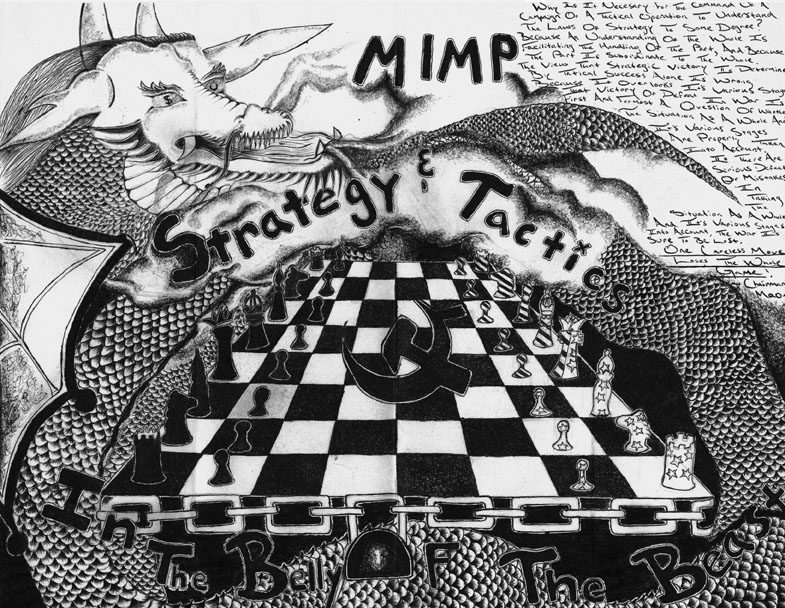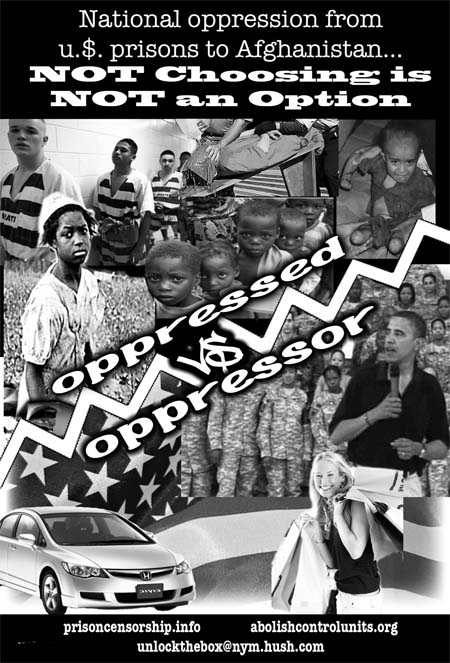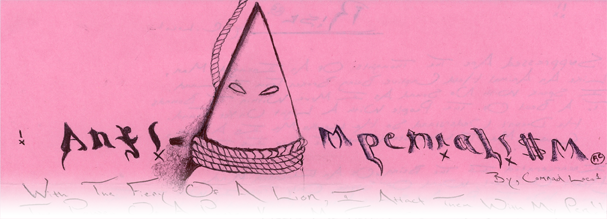
Strategy & Tactics in the Belly of the Beast

Comrades in MIM(Prisons) and United Struggle from Within (USW) have been studying diligently to solidify and advance the line, strategy and tactics of the anti-imperialist prison movement. This issue of Under Lock & Key will introduce this discussion, while focusing on strategies utilizing the bourgeois legal system. In the imperialist countries we face a strategic period where our battles are legal ones as we build our organization and infrastructure.
In March 2010, MIM(Prisons) recorded its 1000th incident of censorship in the u.$. prison system. And this is just a small sample of the repression that goes on in the belly of the beast. The strategy behind our legal battles is two pronged: 1) when we win we create more space to do the organizing work that is much needed in the movement, and 2) when we lose we build public opinion about the reality that there are no rights, only power struggles, and what real power looks like. Therefore, if done well, every battle moves us forward.
Organizationally, we stand at a juncture where MIM(Prisons) has established itself with a consistent practice, while upholding the political line developed by the Maoist Internationalist Movement. Meanwhile, our allies stand ready to do more to organize the movement. This includes our comrades in the anti-imperialist prisoner organization, United Struggle from Within, which is led by MIM(Prisons), as well as other lumpen organizations at various levels of political development.
As a result, we are focusing on the need to build an anti-imperialist United Front through our work in the prison movement. We are making a call to all lumpen and prison-based organizations who believe in the need for self-determination of all nations to join us in developing this United Front on the basis of some key principles. MIM(Prisons), USW and others are already hashing out these principles, and we want to make sure that it is as agreeable yet powerful as it can be.
Theoretically, we stand on the legacy of decades of struggle and political line development led by MIM. By studying their work, we are able to leap forward theoretically, as each generation must do by learning from the previous. There are some theoretical questions we will be developing further in future months, both in the pages of Under Lock & Key and in larger publications we plan to publish.
We will continue to explore important aspects of strategy for months to come. We begin here with some definitions to help our readers grasp and participate in this discussion.
Definitions
Imperialism: the global economic system that exists today. First World corporations have expanded to the point where they must invest money overseas to continue to grow, so they export their capital to the Third World. These foreign investments in Third World economies, safeguarded by military force, stifle the growth of the local bourgeois classes. With no national bourgeoisie, or a weak one at best, a national economy is unable to grow. Imperialist investment then ensures its own dominance by paying dirt wages to workers who have no options, and enjoying the freedom to escape local taxes and environmental restrictions.
Anti-Imperialism: the belief that nations have the right to struggle for liberation when faced with oppression by other nations. Opposing imperialism means opposing the system where some nations use their power to exploit other nations’ wealth. Imperialism stifles all indigenous economic and political activity. Anti-imperialists work to release local development forces to better meet the needs of the people.
Nation: a group of people on one connected piece of land with a common economy, language, and national psychology.
Principal Contradiction: the highest priority contradiction that communists must focus their energy on for a long period of time - a strategic period. The concept of the principal contradiction comes from dialectical materialism, which says that everything can be divided into two opposing forces. These contradictions are the basis for any changes that thing goes through. Defining the principal contradiction is a crucial step to developing ones political line.
The principal contradiction in the world today is between the imperialist countries and the countries they oppress and exploit. Based on this fact, we say the principal task is to build public opinion against imperialism and to build institutions of the oppressed that are independent of imperialism, in order to seize power from the imperialists.
Anti-Imperialist United Front: the loose alliance of classes and parties that work to undermine imperialist domination. To achieve our principal task, we must unite all who can be united on the side of the oppressed against imperialism. Developing an anti-imperialist united front, is facilitating the growth of the winning side of the principal contradiction in the world today.
Internationalism: ethical belief or scientific approach in which peoples of different nations are held to be or assumed to be equal.
Line: Line is generally a belief, but line can also be a goal. For instance, our belief is that only through communism can we abolish the oppression of groups of people over other people. At the same time it is our goal to abolish the oppression of people over other people.
Strategy: our long-term plans to get to various goals on the way to communism. For every stage in the revolutionary struggle, there is a strategy.
Strategic Confidence: the belief that the proletarian forces will win based on a concrete analysis of society. Our strategic confidence comes from an analysis of the contradictions within imperialism, which are bringing about its own decay and destruction. As a minority within the united $tates, the oppressed and progressive forces have a hard time developing strategic confidence when focused narrowly on local events and struggles. Therefore, internationalism is a must for the oppressed nations in the united $tates to obtain liberation from imperialism, which threatens to further immiserate and oppress a growing segment of society as crisis ensues and fascism knocks on the door.
Tactics: Short-term plans, some of which may be used again and again in slightly different circumstances. Tactics are short term and flexible based on day-to-day changes in the situation.
Rightism: In general, rightists tend to be too conservative. A rightist is someone who tends to make everything a matter of tactics. Rightists don’t care about long-term goals or plans.
Ultra-leftism: Ultra-leftists will tend to judge real-world revolutionaries in the light of principles that only Jesus/Moses/Muhammad-type figures could implement. Ultra-leftism thus smacks of religion/idealism. The ultra-left also tends to go to extremes to achieve their objectives.
(note: Rightism and Ultra-leftism are both errors WITHIN the revolutionary movement. We are not talking about the “right” and “left” wings of the amerikan government commonly referred to in the bourgeois press.)
Proletarian Morality: Proletarian morality is based in the basic concept of doing no wrong in the masses’ eyes, but it also goes further than this. It means implementing certain codes of conduct within the party to which all party members must strictly adhere to. This means that we cannot do anything which the masses could see as morally wrong, such as accepting gratuities in exchange for favors, or stealing from the masses. Proletarian morality is not idealist, but recognizes what needs to be done to create a more just world. Pacifists apply an idealist form of morality by saying that violence is never justified. Similarly, anarchists denounce hierarchy and oppression in the hands of the oppressed, even if used as tools to destroy hierarchy and oppression in the bigger picture.
Pragmatism: a philosophy of going forth without theory or line, utilizing wishy washy strategies, and pushing tactics from that thinking. Instead of seeing the whole they see the part. Pragmatists react to a situation, rather than analyze it and address the real problem.
Empiricism: the belief that knowledge is derived from experience through direct observation of phenomena. In contrast, we recognize that 99% of practice is now history and not things that we will experience directly.
Dogmatism: the belief in, or promotion of ideas without basis in fact or without depth. Dogmatists are stubborn, and view things arrogantly and narrow-mindedly.
notes: most of the definitions above came from study and discussion of MIM Theory 5: Diet for a Small Red Planet, download pdf





 Alabama
Alabama
 Alaska
Alaska
 Arizona
Arizona
 Arkansas
Arkansas
 Army Post
Army Post
 California
California
 Colorado
Colorado
 Connecticut
Connecticut
 Delaware
Delaware
 District of Columbia
District of Columbia
 Federal
Federal
 Florida
Florida
 Georgia
Georgia
 Guam
Guam
 Hawaii
Hawaii
 Idaho
Idaho
 Illinois
Illinois
 Indiana
Indiana
 Iowa
Iowa
 Kansas
Kansas
 Kentucky
Kentucky
 Louisiana
Louisiana
 Maine
Maine
 Maryland
Maryland
 Massachusetts
Massachusetts
 Michigan
Michigan
 Minnesota
Minnesota
 Mississippi
Mississippi
 Missouri
Missouri
 Montana
Montana
 Nebraska
Nebraska
 Nevada
Nevada
 New Hampshire
New Hampshire
 New Jersey
New Jersey
 New Mexico
New Mexico
 New York
New York
 North Carolina
North Carolina
 North Dakota
North Dakota
 Ohio
Ohio
 Oklahoma
Oklahoma
 Oregon
Oregon
 Pennsylvania
Pennsylvania
 Puerto Rico
Puerto Rico
 Rhode Island
Rhode Island
 South Carolina
South Carolina
 South Dakota
South Dakota
 Tennessee
Tennessee
 Texas
Texas
 Utah
Utah
 Vermont
Vermont
 Virginia
Virginia
 Washington
Washington
 West Virginia
West Virginia
 Wisconsin
Wisconsin
 Wyoming
Wyoming


 Download
PDF, Print and Distribute
Download
PDF, Print and Distribute